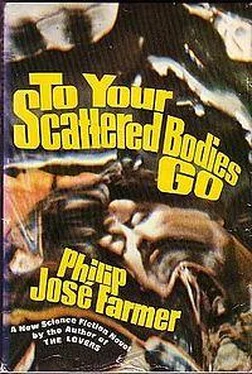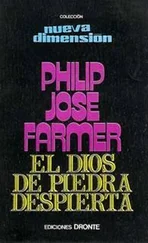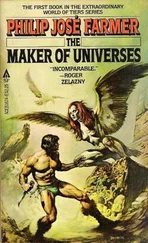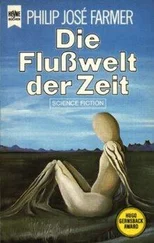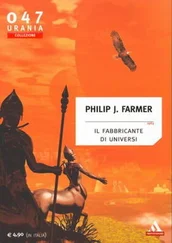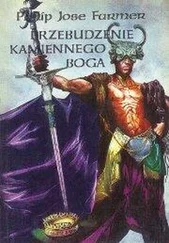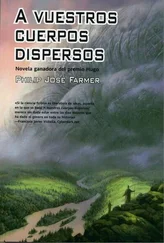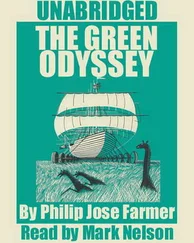He managed to rise far enough to support himself on one elbow.
There were more mushroom-shaped granites along both sides, of the river.
Everywhere on the plain were unclothed bald-headed human beings, spaced about six feet apart. Most were still on their backs and gazing into the sky. Others were beginning to stir, to look around, or even sitting up.
He sat up also and felt his head and face with both hands. They were smooth.
His body, was not that wrinkled, ridged, bumpy, withered body of the sixty-nine-year-old which had lain on his deathbed. It was the smooth-skinned and powerfully muscled body he had when he was twenty-five years old. The same body he had when he was floating between those rods in that dream. Dream? It had seemed too vivid to be a dream. It was not a dream.
Around his wrist was a thin band of transparent material. It was connected to a six-inch-long strap of the same material. The other end was clenched about a metallic arc, the handle of a grayish metal cylinder with a closed cover.
Idly, not concentrating because his mind was too sluggish, he lifted the cylinder. It weighed less than a pound, so it could not be of iron even if it was hollow. Its diameter was a foot and a half and it was over two and a half feet tall.
Everyone had a similar object strapped to his wrist.
Unsteadily, his heart beginning to pick up speed as his senses became unnumbered, he got to his feet.
Others were rising, too. Many had faces which were slack or congealed with an icy wonder. Some looked fearful. Their eyes were wide and rolling; their chests rose and fell swiftly; their breaths hissed out. Some were shaking as if an icy wind had swept over them, though the air was pleasantly warm.
The strange thing, the really alien and frightening thing, was the almost complete silence. Nobody said a word; there was only the hissing of breaths of those near him, a tiny slap as a man smacked himself on his leg; a low whistling from a woman.
Their mouths hung open, as if they were about to say something.
They began moving about, looking into each other’s faces, sometimes reaching out to lightly touch another. They shuffled their bare feet, turned this way, turned back the other way, gazed at the hills, the trees covered with the huge vividly colored blooms, the lichenous and soaring mountains, the sparkling and green river, the mushroom-shaped stones, the straps and the gray metallic containers.
Some felt their naked skulls and their faces.
Everybody was encased in a mindless motion and in silence.
Suddenly, a woman began moaning. She sank to her knees, threw her head and her shoulders back, and she howled. At the same time, far down the riverbank, somebody else howled.
It was as if these two cries were signals. Or as if the two were double keys to the human voice and had unlocked it.
The men and women and children began screaming or sobbing or tearing at their faces with their nails or beating themselves on their breasts or falling on their knees and lifting their hands in prayer or throwing themselves down and trying to bury their faces in the grass as if, ostrich-like, to avoid being seen, or rolling back and forth, barking like dogs or howling like wolves.
The terror and the hysteria gripped Burton. He wanted to go to his knees and pray for salvation from judgment. He wanted mercy. He did not want to see the blinding face of God appear over the mountains, a face brighter than the sun. He was not as brave and as guiltless as he had thought. Judgment would be so terrifying, so utterly final, that he could not bear to think about it.
Once, he had had a fantasy about standing before God after he had died. He had been little and naked and in the middle of a vast plain, like this, but he had been all alone. Then God, great as a mountain, had strode toward him And he, Burton, had stood his ground and defied God.
There was no God here, but he fled anyway. He ran across the plain, pushing men and women out of the way, running around some, leaping over others as they rolled on the ground. As he ran, he howled, "No! No! No!" His arms windmilled to fend off unseen terrors. The cylinder strapped to his wrist whirled around and around.
When he was panting so that he could no longer howl, and his legs and arms were hung with weights, and his lungs burned, and his heart boomed, he threw himself down under the first of the trees.
After a while, he sat up and faced toward the plain. The mob noise had changed from screams and howls to a gigantic chattering. The majority were talking to each other, though it did not seem that anybody was listening. Burton could not hear any of the individual words. Some men and women were and kissing as if they had been acquainted is their previous lives, and now were holding each other to reassure each other of their identities and of their reality.
There were a number of children in the great crowd. Not one was under five years of age, however. Like their elders, their heads were hairless. Half of them were weeping, rooted to one spot. Others, also crying out, were running back and forth, looking into the faces above them, obviously seeking their parents.
He was beginning to breathe more easily. He stood up and turned around. The tree under which he was standing was a red pine (sometimes wrongly called a Norway pine) about two hundred feet tall. Beside it was a tree of a type he had never sees. He doubted that it had existed on Earth. (He was sure that he was not on Earth, though he could not have given any specific reasons at that moment.) It had a thick, gnarled blackish trunk and many thick branches bearing triangular six-feet-long leaves, green with scarlet facings. It was about three hundred feet high. There were also trees that looked like white and black oaks, firs, Western yew, and lodgepole pine.
Here and there were clumps of tall bamboo-like plants, and everywhere that there were no trees or bamboo was a grass about three feet high. There were no animals in sight. No insects and no birds. He looked around for a stick or a club. He did not have the slightest idea what was on the agenda for humanity, but if it was left unsupervised or uncontrolled it would soon be reverting to its normal state. Once the shock was over, the people would be looking out for themselves, and that meant that some would be bullying others.
He found nothing useful as a weapon. Then it occurred to him that the metal cylinder could be used as a weapon. He banged it against a tree. Though it had little weight, it was extremely hard.
He raised the lid, which was hinged inside at one end. The hollow interior had six snapdown rings of metal, three on each side and spaced so that each could hold a deep cup or dish or, rectangular container of gray metal. All the containers were empty. He closed the lid. Doubtless he would find out in time the function of the cylinder was.
Whatever else had happened, resurrection had not resulted in bodies of fragile misty ectoplasm. He was all bone and blood and flesh.
Though he still felt somewhat detached from reality, as if he had been disengaged from the gears of the world, he was emerging from his shock.
He was thirsty. He would have to go down and drink from the river and hope that it would not be poisoned. At this thought, he grinned wryly, and stroked his upper lip. His finger felt disappointed. That was a curious reaction, he thought, and then he remembered that his thick moustache was gone. Oh, yes, he had hoped that the riverwater would not be poisoned. What a strange thought! Why should the dead be brought back to life only to be killed again? But he stood for a long while under the tree. He hated to go back through that madly talking, hysterically sobbing crowd to reach the river. Here, away from the mob, he was free from much of the terror and the panic and the shock that covered them like a sea. If he ventured back, he would be caught up in their emotions again.
Читать дальше
